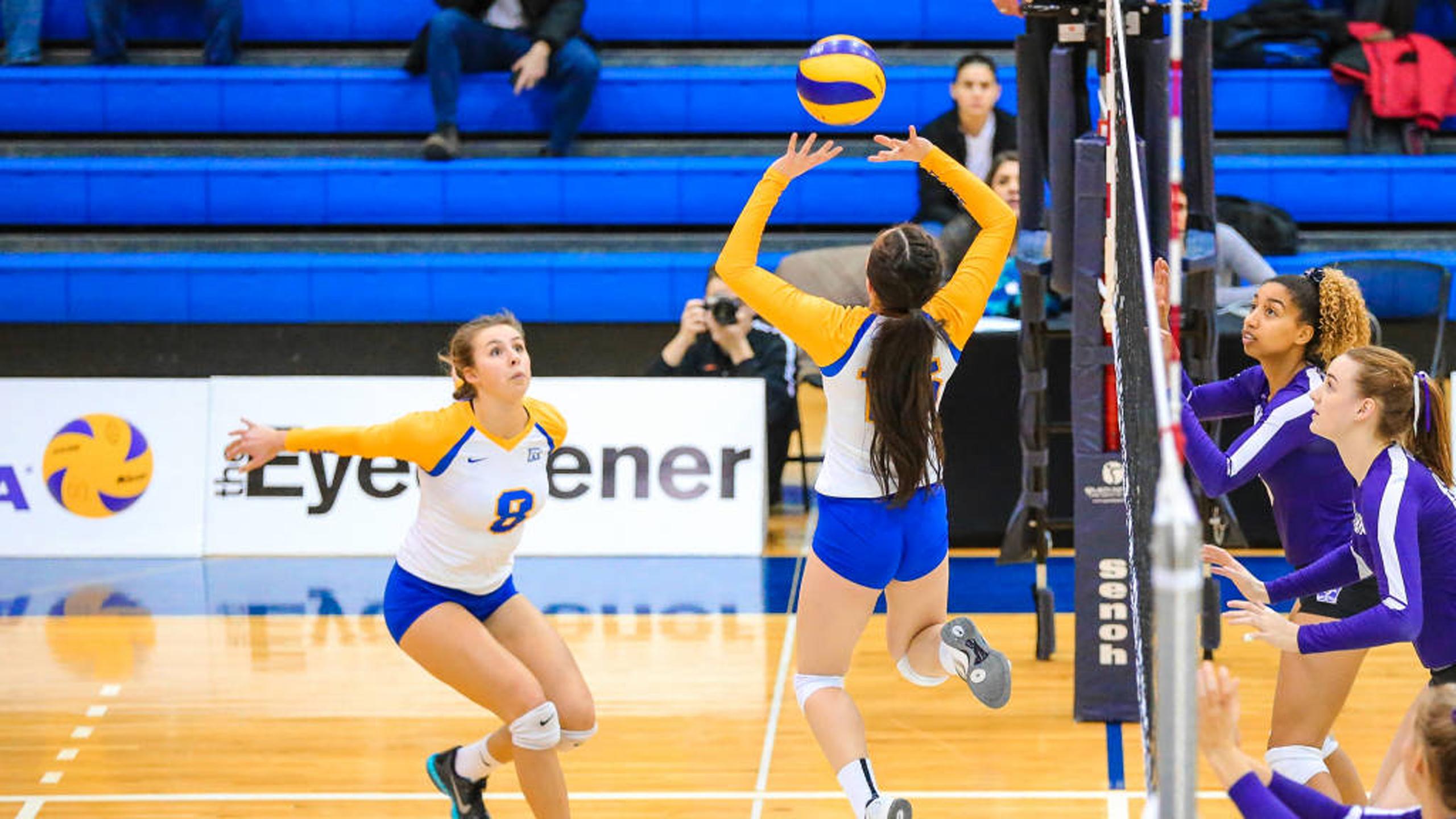By Madison Kelly
Lindsay Kleuskens, a second-year volleyball player for the Ryerson Rams, recalls a time when she was discussing how volleyball teaches life lessons with a fellow athlete and a young father.
They were all generally on the same page—but by the end of the conversation, the man said, “That’s a sport I won’t be getting my girls into. Not with the shorts they wear.” Kleuskens was deeply affected by this remark, “I just thought how sad is it that this guy is willing to deny his daughters all the amazing things volleyball has to offer, because he doesn’t like the length of our shorts.”
“I really think that speaks volumes to how women’s sports are perceived,” Kleuskens said. “So many times female athletes are showcased by the outfits they wear or their body types, [instead of] being a part of a team that works so hard in the weight room to compete at a high level.”
Contrary to male athletes, female athletes have been showcased not for their athletic abilities, but rather for their sex appeal.
By sexualizing and objectifying female athletes, the credibility of female sports is diminished, as audiences tend to focus on the way the athlete looks instead of focusing on the actual sport itself.
Kleuskens’ teammate, Alicia Lam, dealt with a similar incident during high school.
“My first encounter was with my high school volleyball team as we were banned from wearing spandex, because apparently it showcased a sex appeal that was inappropriate for school,” she says. “Many girls took offence to this as the standard uniform is spandex, not for the reason to show off our bodies but because that was most comfortable.”
“I just thought how sad is it that this guy is willing to deny his daughters all the amazing things volleyball has to offer, because he doesn’t like the length of our shorts”
Women athletes have to walk a fine line when it comes to their appearance. Women in sports have either been told their outfits are not modest enough or they should be more revealing, which ultimately forces them into being sexualized and objectified by men.
In 1943, in the All-American Girls Professional Baseball League, the women were forced to wear skirts, even though it actually made it more difficult to play, according to an article written by Elle magazine.
As a result of the media’s sexual depiction of female athletes, it allows for coaches to feel as though they also have the ability to over-sexualize their players.
“Personally, I have experienced it with my coaches and teammates. They often assume if girls come to practice or games with makeup or their hair done, then ‘they’re not ready to play,’” said Olivia Pepe, second-year fastpitch softball player at Ryerson. “I’ve also been judged for my body. Since I don’t have the petite physique, sometimes I’m underestimated.”
“Do women who are elite athletes need to wear makeup to feel stronger, or is it simply a fashion statement?”
Sexualizing female athletes not only affects the athletes themselves, it also affects female viewers as they are discouraged by the representation of women in sports. In the 2016 Olympics, many female athletes were subjected to this ongoing issue. During a panel for Fox News, host Tamara Holder said, “We all know the old adage ‘sex sells.’ Well now, female Olympians are sexing it up more than ever by wearing makeup during their competitions.”
“Do women who are elite athletes need to wear makeup to feel stronger, or is it simply a fashion statement?”
After Holder posed the question, male panellists Bo Dietl and Mark Simone added on to Holder’s comments, with the latter saying “Why should I have to look at a girl’s zits?”
Not only were women critiqued on their physical appearances, they were also objectified for their athletic abilities.
American swimmer Ryan Lochte said that fellow countrywoman Katie Ledecky swam “like a guy” during an interview with Sports Illustrated. After becoming the first woman to win FIFA’s player of the year award, Norwegian soccer player Ada Hegerberg was sexualized when she was asked by French DJ and producer Martin Solveig to twerk on stage. She refused to do so, and walked off the stage.
From the Rams athletes to the pros, it’s clear that there’s a pattern. There’s nothing wrong with being beautiful, but when it comes to sports, the athletic accomplishments should be what comes first and foremost.











Stacey Clemans
The father has the right to encourage/discourage his children from certain experiences if he deems something about it inappropriate. And we shouldn’t try to shame him for his honest thoughts. And I disagree with the statement that spandex volleyball shorts are comfortable. Why? It’s due to the fact that girls are adjusting the legs of the spandex many times during the games(they creep up). And I’ll be honest, I wear make-up everyday, whether I am playing volleyball, coaching, working. It’s just part of my getting ready. So why in the world are we even talking about women wearing make-up whether in sports or at the grocery store? Seriously? Who cares? And we can all decide how shallow a guy is if they even mention a girl’s zits. I mean, grow up, man! If it truly bothers a girl to be “sexualized” because of what they wear then they will change what they wear. If they really don’t care what others think, then it won’t matter if they are wearing bikinis to play volleyball in.
Reid Abook
If he had a son, he would not be deprived of any opportunity due to the uniform associated with a sport (it’s a double standard). Coaches are also usually reasonable people, you could just ask to wear longer shorts. It’s not like a mouth guard, which is required for protection. Also, what do you know about the comfort-ability of spandex? It’s completely subjective to the person who is wearing them. Make-up is no different, to each their own, wear it or don’t. Really, all that matters is a person is comfortable and is able to play (whatever the sport) as best they can and isn’t distracted with uniform or make-up/hair adjustments. The point of the entire article is that sexualizing women in sport takes away from the sport itself. A women’s body is not a sex object. We are here to play and work hard. Whatever that includes, whatever shorts you want to wear, make-up or not, you’re expected to show up, 100% ready to go.
Question, if a father never gives his daughter the chance to be a part of a team and enjoy a sport (as much as I, and so many others have) because he disagrees with the uniform, then how is his daughter suppose to make her own decisions? If theirs no initial exposure to the sport, how is she suppose to know “if it truly bothers a girl to be sexualized”? When is she suppose to make a decision on changing what she wears? (which she shouldn’t have to do in the first place. It’s screwed up if you think a girl is the one responsible for changing their behavior (clothes) because a man/men decides that they are not a person). If her father is making the decision for her, he’s taking away her capacity to choose things for herself. It’s not about him, it’s about her.
I’m not sure if you were ever a varsity athlete or participated in sports, or was a part of a team.. but what we do on the court (field, in the arena, or on the mat), the hard word and dedication to the sport, the bond we share with our fellow teammates and coaches, is special and more significant than any pair of shorts or shade of lip-stick. Yet still, a lot of the time we’re seen as objects, and it’s disgusting.